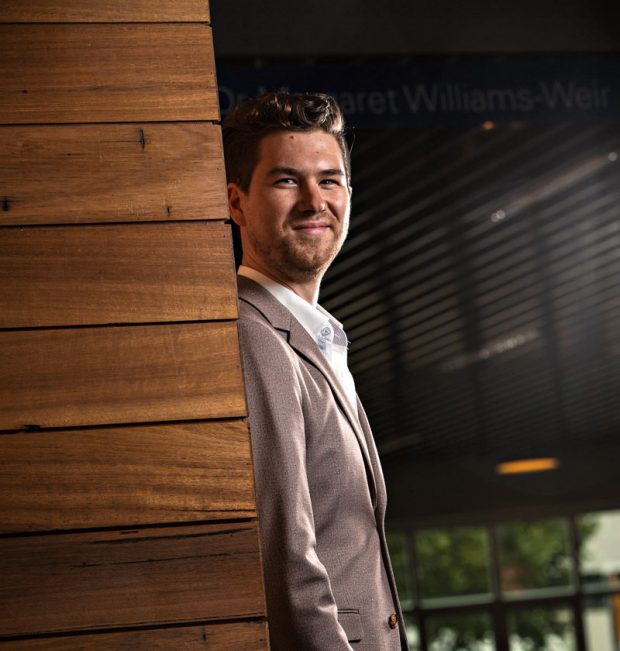The power of speech
Nathaniel Swain (BA 2010, MSpeechPath 2012, GCall 2016), Winner of the University of Melbourne’s Three Minute Thesis in 2016.
Nathaniel Swain credits studying Japanese with kick-starting his passion for speech and language.
“I soon discovered it wasn’t actually Japanese that I was interested in; it was the phenomenon of language and communication altogether,” he says.
Quickly changing his major to Linguistics, Swain thought about how to apply his passion to a profession, and came across speech pathology towards the end of his degree. After graduating, he immediately enrolled in the Master of Speech Pathology.
“As soon as I went into it I really loved it, and could see enormous benefits of having experts in communication and language address these sorts of problems,” he says.
The problems Swain refers to are developmental language disorders, hidden disabilities that impair an individual’s ability to comprehend language or to express themselves through speech. This affects 10 to 15 per cent of the population.
In 2014, after working as a speech pathologist for a year, Swain became a PhD candidate and a National Health and Medical Research Council (NHMRC) postgraduate scholar. His thesis centres on language disorders in young offenders, whose disabilities can contribute to their disengagement from society, and also prevent them benefiting from rehabilitation interventions such as counselling and cognitive behavioural therapy.
“There are only a handful of speech pathologists working in youth justice at the moment,” Swain explains.
“My research was looking at a way that a speech pathologist could go in and directly try to make a difference in the communication skills of some of the boys that were in there.”
“I could see enormous benefits of having experts in communication and language address these sorts of problems.”
Ultimately, Swain’s results showed he could make a meaningful difference in some young offenders’ communication skills. The boys, and their teachers, responded positively. Swain hopes policy-makers and youth justice professionals take notice.
Last September, Swain stepped up his efforts to share his findings by entering the University’s Three Minute Thesis (3MT) competition. He won, and subsequently flew to Brisbane for the Asia-Pacific contest, where he placed runner-up.
“3MT tends to work well for projects where researchers demonstrate how it will affect the public, like medical researchers saving lives, or engineers producing efficient solar cells,” Swain explains.
“I felt very proud to win. I saw it as a sign that my research resonated with people and that its impact was understood.”
By Erin Munro (BA 2006)



